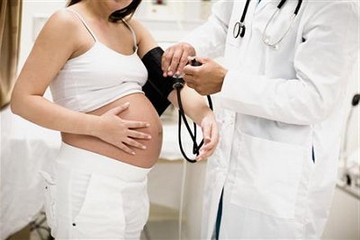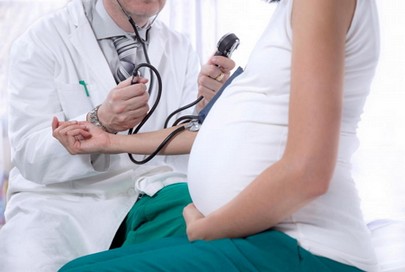Symptoms Of High Blood Pressure In Pregnancy

Contents:
- Symptoms of High Blood Pressure During Pregnancy
- Symptoms of Hypertension
- The Reasons of High Blood Pressure
- Pregnancy Complications Against the Background of High Blood Pressure
- Prophylaxis of Complications During Hypertension
- Puerperal Period in Treating Arterial Hypertension
Symptoms of High Blood Pressure During Pregnancy
Blood Pressure (BP) is a term for the force with which blood flowing through arteries presses on their walls. When pressure in arteries becomes too high, it is called high blood pressure or hypertension. In most cases when women have such pressure in pregnancy, normal and absolutely healthy children are born, but nevertheless some of them have problems with health. The problems related to high BP arise in 6-8 % of expectant mothers. Complications may be of different severity, and most often include premature births and small weight of the newborn child.
Quantitative value obtained by blood pressure measurement represents a fraction of two numbers. The first one is systolic pressure, which results from heart beat. The second is diastolic pressure which indicates pressure when the heart has a rest between contractions. Pressure, which exceeds value of 140/90 is hypertension.
Symptoms of Hypertension
When blood pressure is raised, the next symptoms may appear:
- headache (its reinforcement will be directly proportional to the BP level);
- giddiness;
- sonitus;
- pressure sense on eyes;
- general weakness;
- nausea and vomiting;
- reddening on the face and on a region of the chest,
- "front sights" flashing before eyes.
"Treachery" of raised blood pressure in pregnancy is that in certain cases even at high BP value the patient doesn't feel any pathological symptoms. The woman feels normally and proceeds with her usual daily activity. High blood pressure is indicated incidentally, for example, during the next visit to antenatal clinic. But lack of clinical manifestation of high BP doesn't exclude development of serious complications which can threaten life of the mother and her future child therefore it is very important to carry out regular control of blood pressure during pregnancy.
The Reasons of High Blood Pressure

In most cases there are no certain reasons which would explain why the woman has high pressure in pregnancy. In such cases they speak about idiopathic hypertension or primary hypertension. Researches show that a series of factors can increase risk of development of primary hypertension in pregnant woman.
Treat such factors:
- age – most often hypertension affects women who became pregnant at age after 35 or after 40 years;
- the burdened heredity. In this case risk increases with age;
- smoking and alcohol abuse;
- obesity and high level of cholesterol in blood;
- food which is high in fat or salt;
- potassium lack;
- low physical activity;
- some chronic diseases, such as diabetes mellitus;
- constant stresses.
Besides, in 5-10 % of cases high blood pressure in pregnancy may become the result of such reasons as renal diseases, tumors of adrenals, congenital heart disease and taking some drugs, for example, such as contraceptive tablets (attentively read directions how to take oral contraceptives!), cold and medicine and antiedematouses. This type of high BP is called secondary hypertension which, as a rule, arises suddenly and can lead to sharp pressure jump.
Pregnancy Complications Against the Background of High Blood Pressure
The pregnant woman with serious preeclampsia or serious arterial hypertension can have such complications as cardiac failure, cramps, problems with kidneys and liver, loss of sight and even stroke. But besides, there are still a number of other complications which can arise during pregnancy and in labors.
Treat them:
- Low weight of the newborn child. High BP can lead to a lesion of blood vessels in uterus that may reduce the inflow of oxygen and useful nutrients that are necessary for the child.
- Placental detachment. If the placenta partially or completely exfoliates from uterus wall before labors, it may limit the amount of oxygen and necessary nutrients that enter the child’s organism and can cause severe bleeding in mother’s body.
- Premature births. Some women with serious hypertension or preeclampsia need an early odynagogue to prevent complications potentially hazardous to health of the mother and the child.
Prophylaxis of Complications During Hypertension
First of all lead a healthy lifestyle. To some women in order that their pressure is back to normal, it is enough to make some changes to the everyday life and diet. For example, using of salt may be limited and simple physical exercises could be taken to lose weight (if necessary).
Secondly, it is necessary to eat properly and eat only healthy foods. Try to refuse salty and smoked products, give preference to a vegetable vitamin-rich nutrition.
Thirdly, ensure good draft of your rest. Decrease of stresses and restriction of operating time are the best way to prevent high blood pressure in pregnancy (by the way, it should be recalled that pregnant woman can ask her employer to transfer her to more mild work!). And if there is an opportunity to take a nap a little in the afternoon – don't miss it!
Fourthly, keep track of your weight. Of course, the normal increase of weight shows that your child normally grows, but excess weight leads to additional load on your heart.
Fifthly, refuse alcohol at all and stop smoking if you don't have done it yet!
Puerperal Period in Treating Arterial Hypertension
If you have gestational or chronic hypertension or soft preeclampsia, then delivery is the only remedy against this problem. Blood pressure after the childbirth usually comes back to norm. If it doesn't, then your doctor will prescribe to you special treatment.
Women with serious preeclampsia usually remain under fixed observation of medical experts within several days after delivery. The obstetrician-gynecologist will check your pressure and signs of development of any other complications. It is a lot of cases of eclampsia and HELLP syndrome (hemolysis) happen after labors, usually within 48 hours.
Women who have had high blood pressure and preeclampsia during pregnancy are recommended to nurse the child even if they take pharmaceutical preparations for reducing pressure decrease. Your doctor will have to assign drugs which are safe for your baby. Besides, hold a consultation with the gynecologist about contraception methods. Don't begin to take contraceptive tablets! Oral contraceptives can't be prescribed during breast feeding period, and high blood pressure is another one contraindication for taking contraceptives!